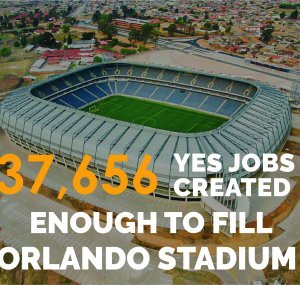
With more than 1,100 private sector partners such as Nedbank, ABSA and VW, YES has already filled the FNB Stadium’s neighbour, the Orlando Stadium, in 19 months. That’s more than 37,656 new work experiences created – but the task is still huge. Many more stadia need to be ‘filled’ to make a dent in the problem.
“We must do more to reset the economy. That first job for youth is the trigger to an economic cascade of events and is the only way to address inequality quickly. It is inequality which is breaking our nation,” says Dr Tashmia Ismail-Saville, the chief executive of YES.
In official terms, these young people are referred to as ‘not in employment, education or training’ (NEET). In reality, they are effectively shut out of the economy, with little hope of gaining
experience in the labour market, receiving an income from work, or enhancing their education and skills.
It doesn’t have to be this way. Creating income-generating job opportunities for South African youth can help reignite the country’s economy as it emerges from the Covid-19 pandemic, and have a direct positive impact on intractable challenges like poverty alleviation and social development in the process.
Building a track record of job creation
YES’s track record of delivering youth jobs and catalysing youth employability points to the broader potential impact of this approach. Describing itself as ‘a collaborative economic enabler’, YES’s ability to create jobs comes from working closely with big business, with the support of government and labour. The 37,656 jobs created to date have poured over R1.7 billion into community economies through youth salaries. In all, 61% of these placements have been women.
“Youth unemployment in South Africa was well over 50% before the pandemic started, and will undoubtedly rise as the crisis continues to play out. What our direct feedback from young people placed in 12-month work experiences is telling us is that when employed, the youth play a vital role in easing social burdens, and become active drivers of change within their communities,” said Dr Ismail-Saville.
Research by the World Bank and the International Labour Organisation shows that youth employment programmes have long-term positive effects on skills development, entrepreneurship, and economic development. In other words, facilitating the entry of young skilled people into the productive sectors of an economy enables the economy to increase its productivity and competitiveness.
As far back as 2005, a resolution concerning youth employment at the International Labour Conference made this abundantly clear: “Decent work for young people unlashes multiplier effects throughout the economy and society, boosting investment and consumer demand and ensuring more stable and cohesive societal ties across generations.”
The ROI of investing in our youth
YES’s own Hearing Youth Voice Survey, of over 3,000 youth in 12-month work experiences, highlights the critical need for South Africa to continue to create jobs to increase the economic participation of the youth. In all, 80% of the youth surveyed were supporting more people financially with their YES salaries since the lockdown started, including family, friends and even neighbours.
“Investing in our youth pays off and has far wider impacts than simply putting someone in a job. South Africa cannot afford the staggering economic costs on public budgets of long-term unemployed youth – but we have the clear opportunity to pivot this most pressing of issues to our advantage by using youth jobs to drive social and economic outcomes,” said Dr Ismail-Saville.
Creating youth jobs sounds laudable in theory. Getting it right has proved more of a challenge – not just in South Africa, but around the world. This is where YES is getting innovative, by harnessing the twin imperatives of creating youth jobs and giving the private sector the ability to level up their B-BBEE scores quickly and costeffectively. In a nutshell, companies employ young people on paid 12-month work experiences, gaining B-BBEE points in the process.
While many balk at the costs at first glance, they quickly realise this approach is more cost effective than other mechanisms they use to up their B-BBEE ratings. To date, around 1,100 South African companies have worked with YES, and it is looking to increase this number exponentially in the coming months to deliver what it calls ‘a win-win-win for our country, our companies and our youth’, and to respond to President Cyril Ramaphosa’s intention to use the crisis as a springboard to drive radical economic transformation.
Doing B-BBEE right
“It’s high time we found a way to break through South Africa’s jaded approach to B-BBEE, and doing real B-BBEE that is both broad-based and impactful. When it comes to youth employment, micro-activities lead to macro-impacts. With a large cohort of disadvantaged youth in South Africa, marginal investments in skills and employment opportunities will lead to exponentially larger changes in the labour market and broader economy of the country,” said Dr Ismail-Saville. “This will be key in the country’s ability to rebound from the economic effects of the pandemic.”
These effects have been brutal. The Hearing Youth Voice Survey, which measured economic activity and the impact of COVID-19 on youth placed in jobs by YES, found that 43% of households of youth currently employed in 12-month work experiences are earning less than half of what they earned before the pandemic. Of the 80% of youth supporting more people financially, 40% said one or more family members have lost their jobs due to COVID-19, making the YES salary even more critical now.
Keeping South Africa’s youth connected will be key to the building of employment opportunities. As the ILO points out in its ‘Global Employment Trends for Youth 2020’ report2, digital technologies present an excellent opportunity to strengthen employment services and job matching. Because of the high penetration of mobile phones among the youth, digital technologies allow public employment services to overcome limited resources and provide access to hard-to-reach areas, including those living in remote areas.
However, says the report, it is essential to ensure that the digitally illiterate are not excluded: these are often people with little attachment to the labour market, such as the long-term unemployed and so-called NEET youth. This is borne out by YES’s survey, which highlights the importance of technology and digital networks in the youth’s ability to access jobs. A cornerstone of YES’s 12-month work experiences is that the youth are given smartphones and zero-rated training modules, enabling them to connect more broadly to employers and opportunities.
“The fact that 61% of youth in the survey are spending more on data and WIFI, over other items, at this time tells a powerful story of our youth’s need to stay connected, and the vital importance of technology and digital linkages in accessing and getting jobs in this economy,” says Dr Ismail-Saville.
The bottom line? “If the private sector doesn’t become part of the solution to South Africa’s youth unemployment problem, and see itself as part of the transformation solution, we may reap a whirlwind of ever-widening economic inequality and decay. And that’s something none of us can afford.”
1Statistics South Africa, Quarterly Labour Force Survey, 1st Quarter 2020 http://www.statssa.gov.za/?page_id=1854&PPN=P0211&SCH=7889






